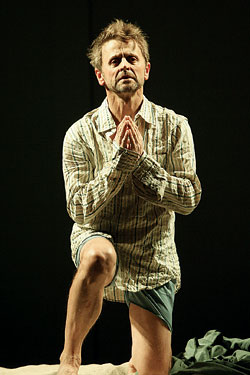
Bad things are happening to Mikhail Baryshnikov. An unseen force shoves him to the ground, getting sand all over his trim dark suit. A pitcher of water dangling overhead sails away before he can drink. Later, as urgent Philip Glass music blares, a harpoon from Wile E. Coyote’s arsenal jabs him as he’s curled up in a green sack. In the first two of the four plays that make up “Beckett Shorts,” the evening of one-acts by Samuel Beckett at New York Theatre Workshop, Baryshnikov suffers these indignations silently.
But that doesn’t mean he suffers them mutely. Agile, compact, and eloquent to his toes, the great dancer requires only a quizzical gaze or a dusted-off sleeve to convey that, however absurd Beckett’s universe may grow, he’ll take the affronts in fine Continental stride: He’s perplexed, to be sure, by the palm tree that abruptly launches itself into the sky, but you won’t catch him getting worked up about it.
These two plays, Act Without Words I and Act Without Words II, are brief and nonsensical—a description that accords pretty neatly with their author’s view of life—yet Baryshnikov finds their humor and even their charm. As he stacks boxes to reach the pitcher, only to tumble right back to the sand, his limber poise reminds you that Beckett, for all his despair, is really an existential vaudevillian: the anti-Chaplin in whose plays humanity is forever wiping out on God’s banana peel.
Under JoAnne Akalaitis’s direction, the cosmic crises in the last two pieces—the ones in which people talk—are much less satisfying. She translates Eh Joe from television to the stage by projecting live video at a scrim, behind which we dimly see the three-dimensional Baryshnikov on a bed. Having lured one of the planet’s most physically gifted humans to the stage, couldn’t NYTW come up with another way to keep him mobile? At least Rough for Theatre I lets him utter Beckett’s most concentrated statement of anomie and gloom. Though he’s thought of letting himself die, Baryshnikov’s blind violinist says, he has managed to fail even at failing: “I’m not unhappy enough.”
There’s yet more spooky silence to be heard—or not heard?—in Harold Pinter’s The Homecoming. An academic (James Frain) brings his wife (Eve Best) to the shabby London home of his father (Ian McShane) and brothers (Raúl Esparza, Gareth Saxe), all of whom punctuate their speech with those famously menacing Pinter pauses. Into these pauses my colleagues have flung all sorts of superlatives about the play’s undimmed power to shock. A story about men trying to steal their sister-in-law that features this much inexplicable violence could hardly do otherwise. But the shocking message now comes with a return address. The play’s slightly breathless view of sexual power dynamics and its surreal streak make it feel anthropological—less a fierce drama than a study in how bold playwrights of the sixties wrestled with these themes.
Director Daniel Sullivan lets actors of very different temperaments rattle against each other here. This is a particular treat when the coolly commanding Best faces down Esparza, who, despite being more sneer than snarl as the violent pimp Lenny, wields a crazy charisma that makes it hard to look away. But their silences still unnerved me less than, say, the fearful and overbearing quiet in The Sopranos, and the brutal language between the pauses stung more acutely in Tracy Letts’s August: Osage County, where the family violence looks and sounds only too real.
Beckett Shorts
By Samuel Beckett. New York Theatre Workshop. Through January 20.
The Homecoming
By Harold Pinter. Cort Theatre. Through April 13.
E-mail: theatercritic@newyorkmag.com.